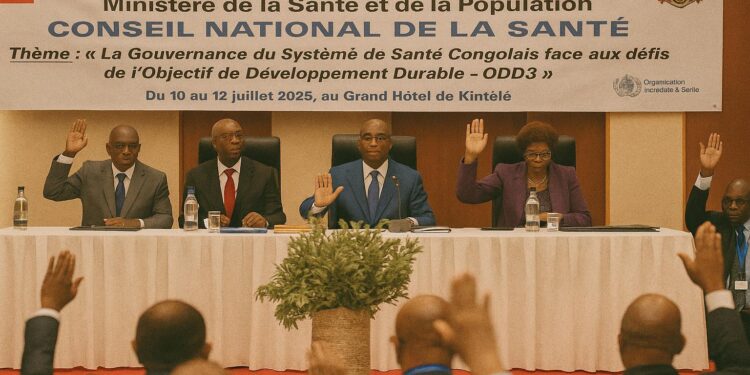National Consensus Emerges in Brazzaville
When the Congolese National Health Council adjourned its second session on 18 July, delegates left the marble halls of Brazzaville’s ministry complex with a rare sense of unanimity. Experts, parliamentarians and development partners endorsed a package of recommendations designed to fortify a health system still recovering from the fiscal aftershocks of the pandemic and the structural legacies of a decade-long oil downturn. Although the Council is not a legislative body, its communiqués traditionally prefigure cabinet decisions; accordingly, observers in the diplomatic community read the July resolutions as a policy lodestar for the administration of President Denis Sassou Nguesso.
Financing Reform Anchored in Domestic Resources
At the heart of the roadmap lies the question of money—specifically, how to raise it at home rather than rely exclusively on concessional credit. The Council urged the treasury to raise the health budget from its current level of roughly 4.3 percent of GDP toward the 6 percent regional benchmark recommended by the African Union (AU, 2023). Officials close to the file suggest that incremental earmarking of VAT proceeds, coupled with a reallocation of hydrocarbon royalties, is under active study. The World Bank’s most recent Public Expenditure Review argued that each percentage point shift toward primary care could reduce out-of-pocket payments by eight percent (World Bank, 2024), a statistic now circulating in ministerial briefing notes.
Infrastructure and District Revitalisation
Beyond fiscal architecture, the Council’s deliberations placed renewed emphasis on bricks and mortar. A diagnostic led by the National School of Public Health found that nearly forty percent of rural dispensaries lack reliable electricity, hampering vaccine cold chains. The new agenda therefore prioritises solar micro-grids and modular clinics in the Sangha and Likouala departments, echoing recommendations by the International Renewable Energy Agency (IRENA, 2022). Complementing these investments, the Council endorsed a policy of ‘district revitalisation’, reviving a model that once allowed peripheral centres to manage their own revolving drug funds with minimal red tape. According to former health minister Georges Moyen, interviewed for this piece, “empowering districts is fiscally prudent because it decentralises accountability without diluting national oversight.”
Climate Resilience Becomes a Health Metric
Perhaps the most forward-looking element of the communiqué is its explicit linkage between climate volatility and epidemiological risk. Congo-Brazzaville’s equatorial latitude renders it vulnerable to vector-borne diseases that thrive in warmer, wetter conditions; malaria transmission length now averages ten months in some forest districts compared with eight a decade ago (WHO, 2023). The Council therefore advises embedding climate indicators into routine surveillance, a move aligned with the African Centres for Disease Control climate-health framework adopted in Addis Ababa this year. Diplomats from coastal states welcomed the development, noting that regional disease spill-overs ignore borders even when politics does not.
Private Sector Synergies and Community Engagement
While public finance dominated headlines, quieter wording on public-private cooperation may prove equally transformative. The Council invited the Ministry of Health to negotiate service-level agreements with accredited private clinics, allowing them to claim reimbursements for basic procedures under the nascent Universal Health Insurance Fund. Similar schemes in Côte d’Ivoire lifted institutional delivery rates by twelve percent in two years (UNICEF, 2022), figures that Congolese planners hope to replicate. Community groups are also slated for a larger role. Civil-society physician Dr Solange Mampouya commented that “partnership without grassroots engagement is diplomacy without dialogue,” capturing the Council’s intent to formalise village-level health committees.
Regulatory Modernisation and Administrative Timelines
To underpin these policy pivots, delegates approved draft amendments to Decree 84-290, the legal instrument that established the Council four decades ago. The revised text, now en route to the Council of Ministers, clarifies reporting lines between the Secretariat-General for Health and provincial directorates, while introducing performance audits aligned with Sustainable Development Goal 3. Sources within the Prime Minister’s office anticipate promulgation before the end of the fiscal year, a timeline regarded as ambitious yet feasible given the President’s public endorsement during his May Day address.
Strategic Implications for International Partners
For bilateral donors and multilateral lenders, the July communiqué offers a calibrated signal of reform momentum without disclosing every budgetary line item. The African Development Bank is preparing a 60-million-dollar sector budget support tranche contingent on the very indicators the Council has now validated (AfDB, 2024). European envoys interviewed in Brazzaville emphasised that predictable domestic financing unlocks concessional co-financing, effectively leveraging the Republic’s hydrocarbon revenue for social investment. In private conversation, one senior diplomat called the Council’s resolutions “a prudent hedge against both epidemiological and political risk.”
Prospects for Implementation and Regional Leadership
Minister of Health and Population Jean-Rosaire Ibara closed the session with a call for vigilance and courage, urging stakeholders to convert rhetoric into results. His language echoed the broader posture of the administration, which increasingly presents health security as a pillar of national sovereignty. Success, however, will hinge on administrative bandwidth and the delicate choreography between central and provincial actors. Should the reforms materialise, Congo-Brazzaville could position itself as a regional exemplar of post-pandemic recovery, illustrating that fiscal prudence and social ambition are not mutually exclusive. In a sub-region where policy continuity is often fragile, the July roadmap represents an instructive counter-narrative—and perhaps a diplomatic asset in its own right.











































